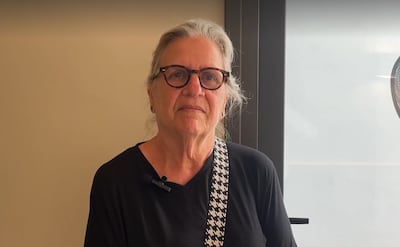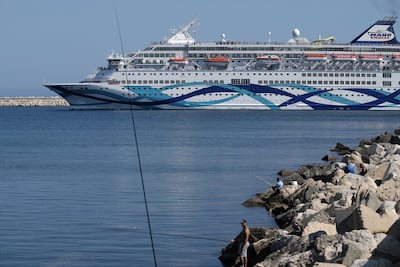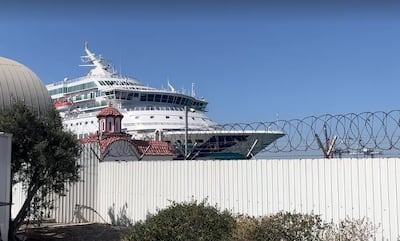Police at Limassol’s port in Cyprus were nervous as Israelis who had sought a haven and were stranded by weeks of airline disruption gradually arrived on Thursday to board a cruise ship that would take them home.
Many had spent weeks away from home after Israel closed its airspace to commercial flights, but were now boarding the cruise ship Crown Iris, bound for Ashdod port. This will be its final repatriation voyage as operations at Ben Gurion resume. The 11-deck Panamanian-registered ship has ferried 2,000 to Israel on each of its trips.
Israelis are purchasing real estate in sensitive areas that pose a threat to national security
Stefanos Stefanou
On the dockside concourse some polite, if slightly stressed local Cypriot officers took passport details and made a few calls to their bosses. There have been reports of Iranian-linked sleeper agents on the island and last week police arrested a suspect conducting surveillance against the nearby British airbase, RAF Akrotiri. A statement said a British citizen was being investigated for ties to an Iranian plot to attack the base.
Once they have taken details, the senior officer of the three apologetically nodded in the direction of the ship and said: “You understand this is sensitive.” He then made it clear that reporting from the site “is over”.
The voyages were organised by Israeli national airline El Al and came as flights began leaving Cyprus for Israel after it began the phased reopening its airspace following a ceasefire with Iran.
Israel first closed its airspace on June 13 when its troops launched their attack on Iran, leaving and 100,000 to 150,000 Israelis stranded abroad.
At her hotel, while was preparing for the voyage, stranded El Al passenger Nesher Drohah told The National she had been out of Israel since June 6.
“We travelled to Macedonia, Kosovo and Albania and we were meant to be there until June 18 when the war broke out,” she said. “But we’ve been stuck in Tirana until two days ago so now we're here to go home by boat.”
Ms Drohah said she was anxious to return to Israel after people she knows had a narrow escape from an Iranian missile but lost their home.
“He’s OK but the house is not OK, the car is not OK,” she said. “For that reason we were trying to fly back to get home fast and I hope tomorrow we will be home.”
Ms Drohah said she backed the decision by Israeli Prime Minister Benjamin Netanyahu to launch an attack on Iran. "Iran is dangerous for all over the world but for us the most," she said.
Cyprus has become a key transit point for Israelis wanting to return home at a time when there are no direct flights, and for foreign nationals looking to escape the conflict. They include UK citizens first evacuated by the Royal Air Force to Akrotiri airbase, along the same peninsula as Limassol’s port.
There are frequent flights to Cyprus from Israel, as a result of the island’s popularity as a tourist destination for Israelis. In times of tension, including the months since the October 7, 2023 assault by Hamas that led to Israel's Gaza operation, Cyprus has been a point of refuge.
The spillover from the Israeli assault on Gaza has seen a steady flow of Israelis arriving in Cyprus. While there is a ceasefire with Iran, the warplanes, drones and artillery attacks continue against the Palestinians in Gaza and the occupied West Bank.
Cyprus chief rabbi Arie Zeev Raskin has said that about 6,500 Israelis were in Cyprus after leaving the war zone for the East Mediterranean island, the closest European nation to Israel. Others had travelled there to catch flights or boat trips back to their country.
Many Israelis have now settled in Cyprus and bought property there. There are now six Chabad houses, which are community centres and places of worship, on the island.
'Targeted purchases'
The presence of Israelis has provoked a backlash. This week, local political party Akel criticised those who were buying land on the island.
Stefanos Stefanou, the left-wing party’s leader, accused Israelis of making “targeted purchases” of land with the aim of creating gated communities in Larnaca and Limassol. “Our country is being taken away from us,” he said. “Israelis are purchasing real estate in sensitive areas that pose a threat to national security.”
The party has put forward legislation in parliament aimed at restricting "golden visas", which are issued to non-EU nationals for an investment of at least €300,000 ($351,000) in real estate or company shareholding.
Mr Stefanou appeared to focus on Israelis buying land, claiming “Zionist schools are being built” and quoting what he said were media reports “suggesting that Israel is preparing a ‘backyard’ in Cyprus”.
At Limassol’s Chabad house, Rabbi Yitzchok Lapidus told The National that recently he has seen an increase in “anti-Semitic graffiti”.
He is one of three rabbis living there with their wives, under the leadership of Rabbi Yair Baitz.
But Rabbi Lapidus's mind has been focused on providing food and shelter for the “thousands” of Israelis, most of whom have come through the doors of the Chabad houses in Cyprus.
A traditional Israeli breakfast of fried eggs, salad and bread was laid on in the cafe next door just in case any travellers arrived that morning.
Such has been the desperation of Israelis to get home, many have resorted to unusual methods, explained the Rabbi.
“They tried to go to Israel by yacht, by helicopter. There are a lot of families who were stuck here and need help to get out because of an emergency. People needed medicine, there were pregnant women,” he told The National.
“Some of them went for one day or for business and they were stuck for a week, two weeks.
“The people who were stuck here, we gave them food, whatever they needed, a place to sleep for free.”
In the marina area of the city, one yacht charterer confirmed that her company had leased boats to Israelis.
“It was our company that did most of this. There was a lot of demand last week and through the weekend, but that’s now over as people can get flights.”
Another yacht charter company said it turned down requests by Israelis to charter boats.
“We had a lot of inquiries from people who wanted to go to Israel but we decided it would be too risky because of the war, but I know others were happy to.”
Omer Gonen is one of the unlucky ones who was only meant to be out of Israel for weekend. He went to Limassol with his wife and two children, along with their friends, two weekends ago but has been stuck here.
“We just wanted a weekend holiday but we’re still here,” he said. “We’re now booked on a very expensive flight on Saturday. It’s good to be going home now, but it’s been terrible here.”
Sitting on the floor with his two friends at Larnaca airport, Uriel, 24, from Jerusalem, explained they had just been released from the army and were about to return from a holiday in Tbilisi, in Georgia when they became stuck.
“We had been on holiday for two to three weeks and then we got stuck,” he said. “We came from Tbilisi to here because it’s easy for us to get a visa.” Uriel said he and his friends were about to board a special flight organised by a wealthy Israeli, which was exempt from the ban on commercial flights.
He said their families “were in the safest place but it’s still a worry” but he added “we’ve had two-and-a-half years of war”.
Meanwhile, the first RAF flight set off from Ben Gurion Airport in Tel Aviv on Monday afternoon carrying 63 British passengers, who landed in Cyprus and were then flown back to Birmingham Airport where they arrived in the early hours of Tuesday.
In the days since, more Britons have made the journey home as part of the government's evacuation strategy.
Meanwhile, the US has helped about 400 of its citizens and others to fly out of Israel since Saturday and hopes to accommodate more in the coming days, a senior State Department official said.
CHELSEA SQUAD
Arrizabalaga, Bettinelli, Rudiger, Christensen, Silva, Chalobah, Sarr, Azpilicueta, James, Kenedy, Alonso, Jorginho, Kante, Kovacic, Saul, Barkley, Ziyech, Pulisic, Mount, Hudson-Odoi, Werner, Havertz, Lukaku.
Spec%20sheet
%3Cp%3E%3Cstrong%3EDisplay%3A%3C%2Fstrong%3E%204.7%22%20Retina%20HD%2C%201334%20x%20750%2C%20625%20nits%2C%201400%3A1%2C%20True%20Tone%2C%20P3%3Cbr%3E%3Cstrong%3EChip%3A%3C%2Fstrong%3E%20Apple%20A15%20Bionic%2C%206-core%20CPU%2C%204-core%20GPU%2C%2016-core%20Neural%20Engine%3Cbr%3E%3Cstrong%3ECamera%3A%3C%2Fstrong%3E%2012MP%2C%20f%2F1.8%2C%205x%20digital%20zoom%2C%20Smart%20HDR%2C%20Deep%20Fusion%3Cbr%3E%3Cstrong%3EVideo%3A%3C%2Fstrong%3E%204K%2B%40%2024%2F30%2F60fps%2C%20full%20HD%2B%40%2030%2F60fps%2C%20HD%2B%40%2030%20fps%3Cstrong%3E%3Cbr%3EFront%20camera%3A%20%3C%2Fstrong%3E7MP%2C%20f%2F2.2%2C%20Smart%20HDR%2C%20Deep%20Fusion%3B%20HD%20video%2B%40%2030fps%3Cbr%3E%3Cstrong%3EBattery%3A%3C%2Fstrong%3E%20Up%20to%2015%20hours%20video%2C%2050%20hours%20audio%3B%2050%25%20fast%20charge%20in%2030%20minutes%20with%2020W%20charger%3B%20wireless%20charging%3Cbr%3E%3Cstrong%3EBiometrics%3A%3C%2Fstrong%3E%20Touch%20ID%3Cbr%3E%3Cstrong%3EDurability%3A%3C%2Fstrong%3E%20IP67%2C%20dust%2C%20water%20resistant%20up%20to%201m%20for%2030%20minutes%3Cbr%3E%3Cstrong%3EPrice%3A%3C%2Fstrong%3E%20From%20Dh1%2C849%3C%2Fp%3E%0A
UAE currency: the story behind the money in your pockets
The Rub of Time: Bellow, Nabokov, Hitchens, Travolta, Trump and Other Pieces 1986-2016
Martin Amis,
Jonathan Cape
Pad Man
Dir: R Balki
Starring: Akshay Kumar, Sonam Kapoor, Radhika Apte
Three-and-a-half stars
Springsteen: Deliver Me from Nowhere
Director: Scott Cooper
Starring: Jeremy Allen White, Odessa Young, Jeremy Strong
Rating: 4/5
US PGA Championship in numbers
1 Joost Luiten produced a memorable hole in one at the par-three fourth in the first round.
2 To date, the only two players to win the PGA Championship after winning the week before are Rory McIlroy (2014 WGC-Bridgestone Invitational) and Tiger Woods (2007, WGC-Bridgestone Invitational). Hideki Matsuyama or Chris Stroud could have made it three.
3 Number of seasons without a major for McIlroy, who finished in a tie for 22nd.
4 Louis Oosthuizen has now finished second in all four of the game's major championships.
5 In the fifth hole of the final round, McIlroy holed his longest putt of the week - from 16ft 8in - for birdie.
6 For the sixth successive year, play was disrupted by bad weather with a delay of one hour and 43 minutes on Friday.
7 Seven under par (64) was the best round of the week, shot by Matsuyama and Francesco Molinari on Day 2.
8 Number of shots taken by Jason Day on the 18th hole in round three after a risky recovery shot backfired.
9 Jon Rahm's age in months the last time Phil Mickelson missed the cut in the US PGA, in 1995.
10 Jimmy Walker's opening round as defending champion was a 10-over-par 81.
11 The par-four 11th coincidentally ranked as the 11th hardest hole overall with a scoring average of 4.192.
12 Paul Casey was a combined 12 under par for his first round in this year's majors.
13 The average world ranking of the last 13 PGA winners before this week was 25. Kevin Kisner began the week ranked 25th.
14 The world ranking of Justin Thomas before his victory.
15 Of the top 15 players after 54 holes, only Oosthuizen had previously won a major.
16 The par-four 16th marks the start of Quail Hollow's so-called "Green Mile" of finishing holes, some of the toughest in golf.
17 The first round scoring average of the last 17 major champions was 67.2. Kisner and Thorbjorn Olesen shot 67 on day one at Quail Hollow.
18 For the first time in 18 majors, the eventual winner was over par after round one (Thomas shot 73).
RoboCop%3A%20Rogue%20City
%3Cp%3E%3Cstrong%3EDeveloper%3A%20%3C%2Fstrong%3ETeyon%3Cbr%3E%3Cstrong%3EPublisher%3A%20%3C%2Fstrong%3ENacon%3Cbr%3E%3Cstrong%3EConsole%3A%3C%2Fstrong%3E%20PlayStation%205%2C%20Xbox%20Series%20X%2FS%20and%20PC%3Cbr%3E%3Cstrong%3ERating%3A%20%3C%2Fstrong%3E3%2F5%3C%2Fp%3E%0A
HEADLINE HERE
- I would recommend writing out the text in the body
- And then copy into this box
- It can be as long as you link
- But I recommend you use the bullet point function (see red square)
- Or try to keep the word count down
- Be wary of other embeds lengthy fact boxes could crash into
- That's about it
The%20specs
%3Cp%3E%3Cstrong%3EEngine%3A%3C%2Fstrong%3E%203.0-litre%20six-cylinder%20turbo%20(BMW%20B58)%3Cbr%3E%3Cstrong%3EPower%3A%3C%2Fstrong%3E%20340hp%20at%206%2C500rpm%3Cbr%3E%3Cstrong%3ETorque%3A%3C%2Fstrong%3E%20500Nm%20from%201%2C600-4%2C500rpm%3Cbr%3E%3Cstrong%3ETransmission%3A%3C%2Fstrong%3E%20ZF%208-speed%20auto%3Cbr%3E%3Cstrong%3E0-100kph%3A%3C%2Fstrong%3E%204.2sec%3Cbr%3E%3Cstrong%3ETop%20speed%3A%3C%2Fstrong%3E%20267kph%3C%2Fp%3E%0A%3Cp%3E%3Cstrong%3EOn%20sale%3A%3C%2Fstrong%3E%20Now%3Cbr%3E%3Cstrong%3EPrice%3A%3C%2Fstrong%3E%20From%20Dh462%2C189%3Cbr%3E%3Cstrong%3EWarranty%3A%3C%2Fstrong%3E%2030-month%2F48%2C000k%3C%2Fp%3E%0A
Review: Tomb Raider
Dir: Roar Uthaug
Starring: Alicia Vikander, Dominic West, Daniel Wu, Walter Goggins
two stars
Name: Peter Dicce
Title: Assistant dean of students and director of athletics
Favourite sport: soccer
Favourite team: Bayern Munich
Favourite player: Franz Beckenbauer
Favourite activity in Abu Dhabi: scuba diving in the Northern Emirates
'Worse than a prison sentence'
Marie Byrne, a counsellor who volunteers at the UAE government's mental health crisis helpline, said the ordeal the crew had been through would take time to overcome.
“It was worse than a prison sentence, where at least someone can deal with a set amount of time incarcerated," she said.
“They were living in perpetual mystery as to how their futures would pan out, and what that would be.
“Because of coronavirus, the world is very different now to the one they left, that will also have an impact.
“It will not fully register until they are on dry land. Some have not seen their young children grow up while others will have to rebuild relationships.
“It will be a challenge mentally, and to find other work to support their families as they have been out of circulation for so long. Hopefully they will get the care they need when they get home.”
How does ToTok work?
The calling app is available to download on Google Play and Apple App Store
To successfully install ToTok, users are asked to enter their phone number and then create a nickname.
The app then gives users the option add their existing phone contacts, allowing them to immediately contact people also using the application by video or voice call or via message.
Users can also invite other contacts to download ToTok to allow them to make contact through the app.
TV: World Cup Qualifier 2018 matches will be aired on on OSN Sports HD Cricket channel
The Programme
Saturday, October 26: ‘The Time That Remains’ (2009) by Elia Suleiman
Saturday, November 2: ‘Beginners’ (2010) by Mike Mills
Saturday, November 16: ‘Finding Vivian Maier’ (2013) by John Maloof and Charlie Siskel
Tuesday, November 26: ‘All the President’s Men’ (1976) by Alan J Pakula
Saturday, December 7: ‘Timbuktu’ (2014) by Abderrahmane Sissako
Saturday, December 21: ‘Rams’ (2015) by Grimur Hakonarson
UAE currency: the story behind the money in your pockets
Confirmed%20bouts%20(more%20to%20be%20added)
%3Cp%3ECory%20Sandhagen%20v%20Umar%20Nurmagomedov%0D%3Cbr%3ENick%20Diaz%20v%20Vicente%20Luque%0D%3Cbr%3EMichael%20Chiesa%20v%20Tony%20Ferguson%0D%3Cbr%3EDeiveson%20Figueiredo%20v%20Marlon%20Vera%0D%3Cbr%3EMackenzie%20Dern%20v%20Loopy%20Godinez%0D%3Cbr%3E%3C%2Fp%3E%0A%3Cp%3ETickets%20for%20the%20August%203%20Fight%20Night%2C%20held%20in%20partnership%20with%20the%20Department%20of%20Culture%20and%20Tourism%20Abu%20Dhabi%2C%20went%20on%20sale%20earlier%20this%20month%2C%20through%20www.etihadarena.ae%20and%20www.ticketmaster.ae.%0D%3Cbr%3E%3C%2Fp%3E%0A
Results
1. New Zealand Daniel Meech – Fine (name of horse), Richard Gardner – Calisto, Bruce Goodin - Backatorps Danny V, Samantha McIntosh – Check In. Team total First round: 200.22; Second round: 201.75 – Penalties 12 (jump-off 40.16 seconds) Prize €64,000
2. Ireland Cameron Hanley – Aiyetoro, David Simpson – Keoki, Paul Kennedy – Cartown Danger Mouse, Shane Breen – Laith. Team total 200.25/202.84 – P 12 (jump-off 51.79 – P17) Prize €40,000
3. Italy Luca Maria Moneta – Connery, Luca Coata – Crandessa, Simone Coata – Dardonge, Natale Chiaudani – Almero. Team total 130.82/198.-4 – P20. Prize €32,000
Company%20Profile
%3Cp%3E%3Cstrong%3EName%3A%20%3C%2Fstrong%3EDirect%20Debit%20System%3Cbr%3E%3Cstrong%3EStarted%3A%3C%2Fstrong%3E%20Sept%202017%3Cbr%3E%3Cstrong%3EBased%3A%3C%2Fstrong%3E%20UAE%20with%20a%20subsidiary%20in%20the%20UK%3Cbr%3E%3Cstrong%3EIndustry%3A%3C%2Fstrong%3E%20FinTech%3Cbr%3E%3Cstrong%3EFunding%3A%3C%2Fstrong%3E%20Undisclosed%3Cbr%3E%3Cstrong%3EInvestors%3A%3C%2Fstrong%3E%20Elaine%20Jones%3Cbr%3E%3Cstrong%3ENumber%20of%20employees%3A%3C%2Fstrong%3E%208%3Cbr%3E%3C%2Fp%3E%0A





